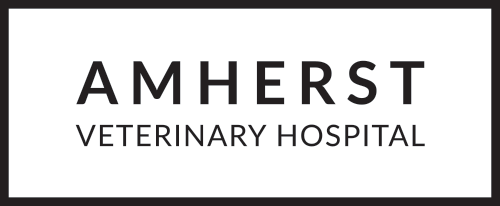Vaccination Programs
Our wellness and vaccination programs are designed to prevent disease and prolong the lives of your companion animals. At Amherst Veterinary Hospital we believe vaccinations are an important part of your pet’s wellness plan. Vaccines have been developed to protect pets against serious life-threatening diseases such as parvovirus, distemper and rabies.
Disease prevention is always less hazardous to your pet’s health and ultimately less costly than dealing with the cost of a preventable disease. During your pet’s annual physical examination, we touch base with you regarding your pet’s health and ask about changes in your pet’s lifestyle. We will recommend a vaccine protocol that is most suited to your particular pet. The decision to vaccinate will be based on a risk-benefit assessment for each vaccine for each pet.
According to the World Small Animal Veterinary Association, American Association for Feline Practitioners and the Canadian Veterinary Medical Association, there are two broad categories for vaccinations;
Core vaccines are vaccines that all pets, regardless of circumstance should receive. Core vaccines protect animals from severe, life-threatening diseases that have a global distribution.
Non-core vaccines are vaccines that should be given to our pet whose lifestyle or local environment places them at increased risk of contracting specific infections.
Puppies
Core Canine Vaccination schedule
| 8 wks | 12 wks | 16 wks | 20 wks |
| Canine parvovirus | Canine parvovirus | Canine parvovirus | Rabies |
| Canine distemper | Canine distemper | Canine distemper |
For adult dogs it is recommended that a booster is given for these vaccines one year later, then every three years ongoing.
Non-core Canine Vaccination schedule
Leptospirosis – This vaccine is given initially, boosted 3-4 weeks later then boosted annually.
Bordetella (aka kennel cough) – This vaccine is given once annually.
Please click here for detailed information on each of these potentially harmful diseases.
Kittens
Core Feline Vaccination schedule
| 8 wks | 12 wks | 16 wks |
| Feline parvovirus | Feline parvovirus | Feline Parvovirus + Rabies |
| Feline herpesvirus | Feline herpesvirus |
For adult cats it is recommended that a booster is given for these vaccines one year later, then every three years ongoing.
Non-core Feline Vaccination schedule
Feline leukemia – This vaccine should be given in a series of 2 vaccines, 3 to 4 weeks apart and then boosted annually.
Please click here for detailed information on each of these potentially harmful diseases.
